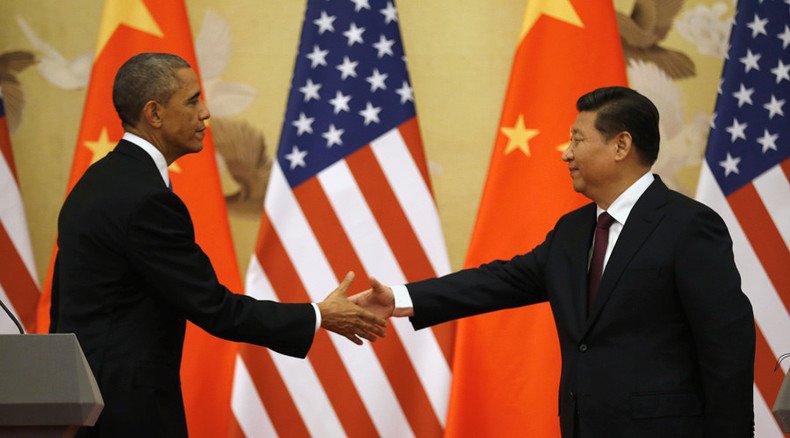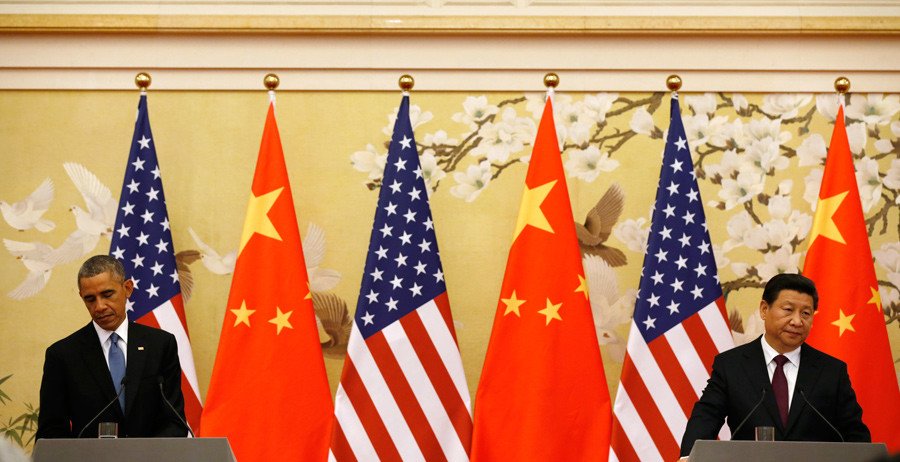‘Beijing and Washington strategically not on the same page’

The US considers China an Asian economic and military hegemon and many in Washington are worried the Chinese economy is overtaking America, Jim Jatras a former US diplomat and GOP Senate policy advisor told RT.
RT: Chinese President Xi Jinping is planning to pay his first state visit to the US. What do you think are the main issues to be discussed between Beijing and Washington?
Jim Jatras: Obviously there are a number of issues on the table between the two countries: the Chinese currency devaluation, the impact of the Chinese economy on the American stock market, the fact that the Chinese have been dumping US Treasuries... the South China Sea. We also have to read into this to some extent that Washington is belatedly worrying about the increased cooperation between Moscow and Beijing, and feels the need to get closer to Beijing. Obviously they have no interest in getting closer to Moscow.
RT: How would you describe the current state of relations between the US and China? Would you say they are close?
JJ: Not close at all. We don’t have a Cold War situation like we do with Russia, but it is not a politically warm relationship either – as I just mentioned [because of issues like] the South China Sea, and so forth. Strategically we cannot say that Washington and China are on the same page. As China’s economy overtakes ours and we see them as an Asian economic and also military hegemon, this is something that has a lot of people in Washington worried.
RT: Do you see any prospects for progress in relations between the two nations?
JJ: No, I don’t see many prospects for progress at all. I think it’s kind of the catch-up ball - try to do some remedial repair of some of the distance that has emerged between the two countries. But frankly, when it comes to substance, I don’t see a whole lot of room for improvement. The way Washington has defined our policies in the western Pacific, I’m not sure what it is that the Chinese are going to give us that Washington will consider a plus.

RT: How do you think the Chinese government sees its future relations with the US?
JJ: I think the way the Chinese see the relationship with Washington is - it is something that is not likely to improve in the short-term. But it is a relationship to be managed like other ones that they have in the world, and that is obviously one of the important ones for them. They understand that they are pursuing their own path for a dominant role in the western pacific and in East Asia, and that Washington is not going to look upon that favorably. They need to maintain the line of communications, but they understand that to some extent it is an adversarial relationship.
READ MORE: US to slap Chinese 'cyber-plunderers' with economic sanctions – report
RT: What differences, in your opinion, currently exist between the two nations? What can potentially serve as stumbling blocks in developing ties?
JJ: I would say cyber security and the South China Sea are certainly high on the list. The other one that maybe doesn’t get as much attention is the question of Korea, and the fact that the US does have troops stationed in Korea; and that the Chinese in a sense have an investment in propping up the North Korean regime, because if they did not do so and Korea was unified, they would have a US-allied state sitting right on their border which raises the whole question: what is the purpose of our commitment to Korea which contributes nothing to our national security.
RT: With the presidential elections approaching in the US, what changes are we likely to see after the vote? Do you think a lot would depend on who makes it to the White House?
JJ: I think it will stay as it is at the moment and trend essentially downward as China becomes a more powerful actor in international affairs, regardless of who wins - a Republican or a Democrat. But obviously the visual provides lots of opportunity for the Republican candidates to bash Obama, say how weak he is, how bad the Chinese are and how undeserved this visit is, and so forth. And that is just expected political grandstand.
The statements, views and opinions expressed in this column are solely those of the author and do not necessarily represent those of RT.
LISTEN MORE:
The statements, views and opinions expressed in this column are solely those of the author and do not necessarily represent those of RT.












